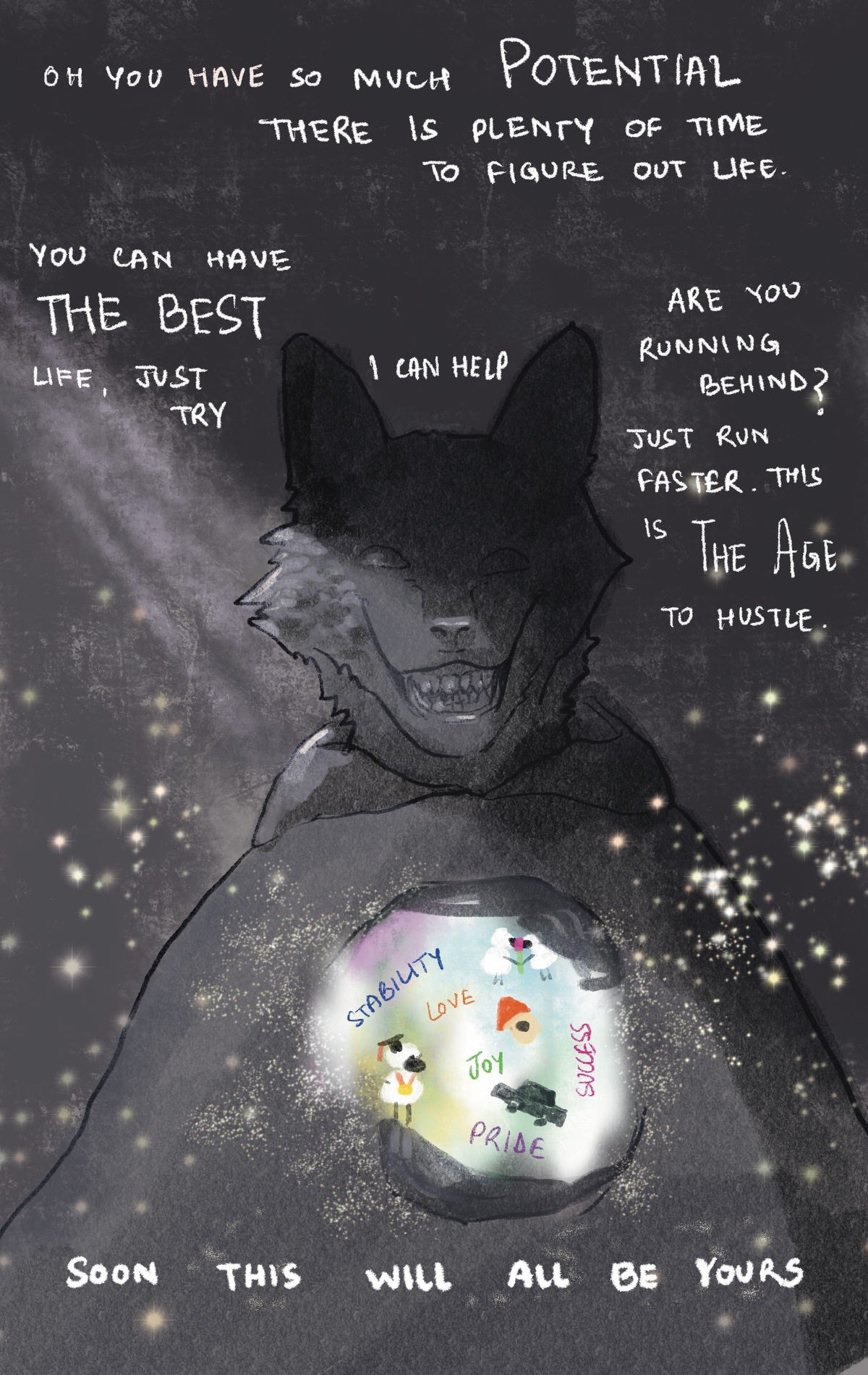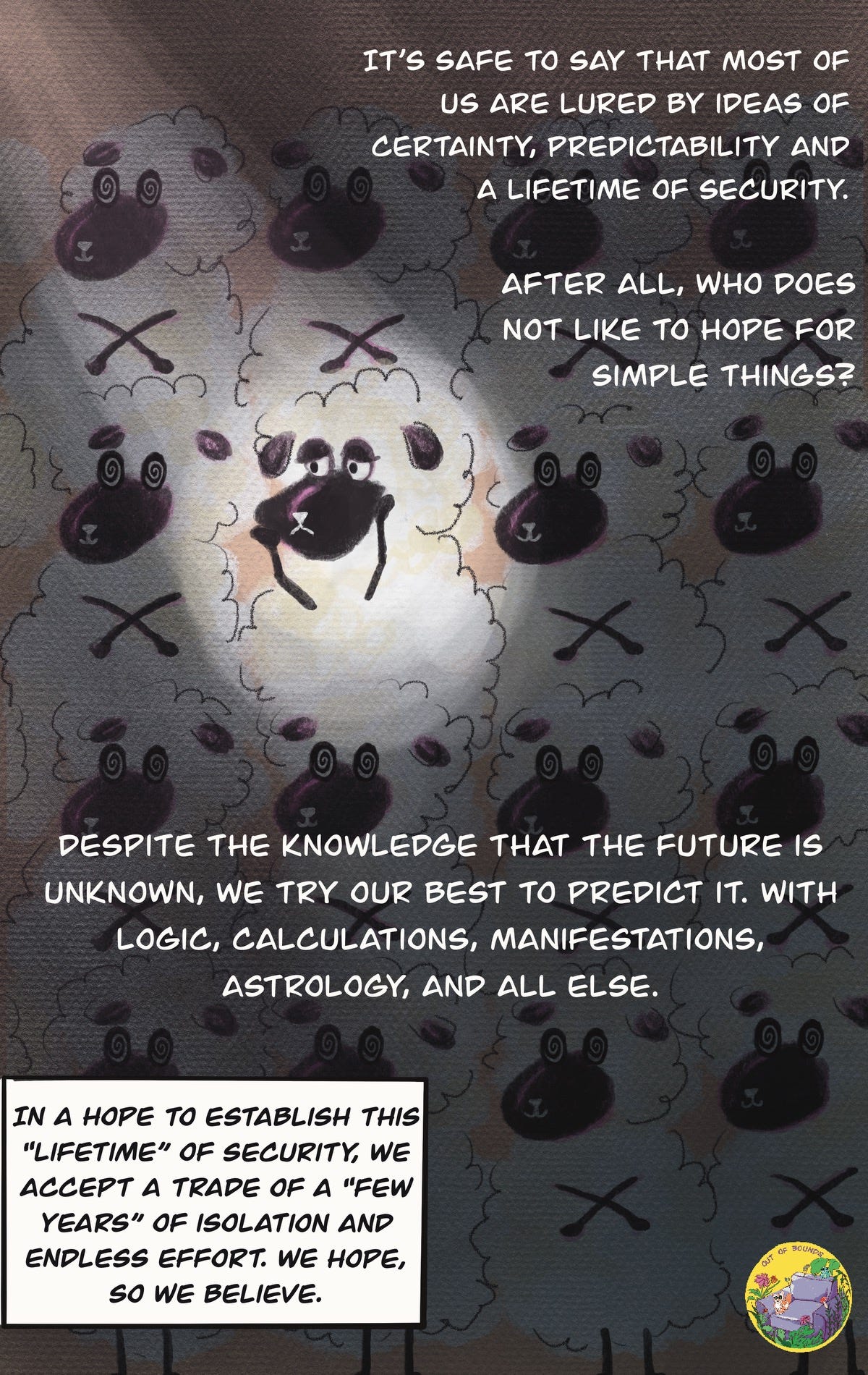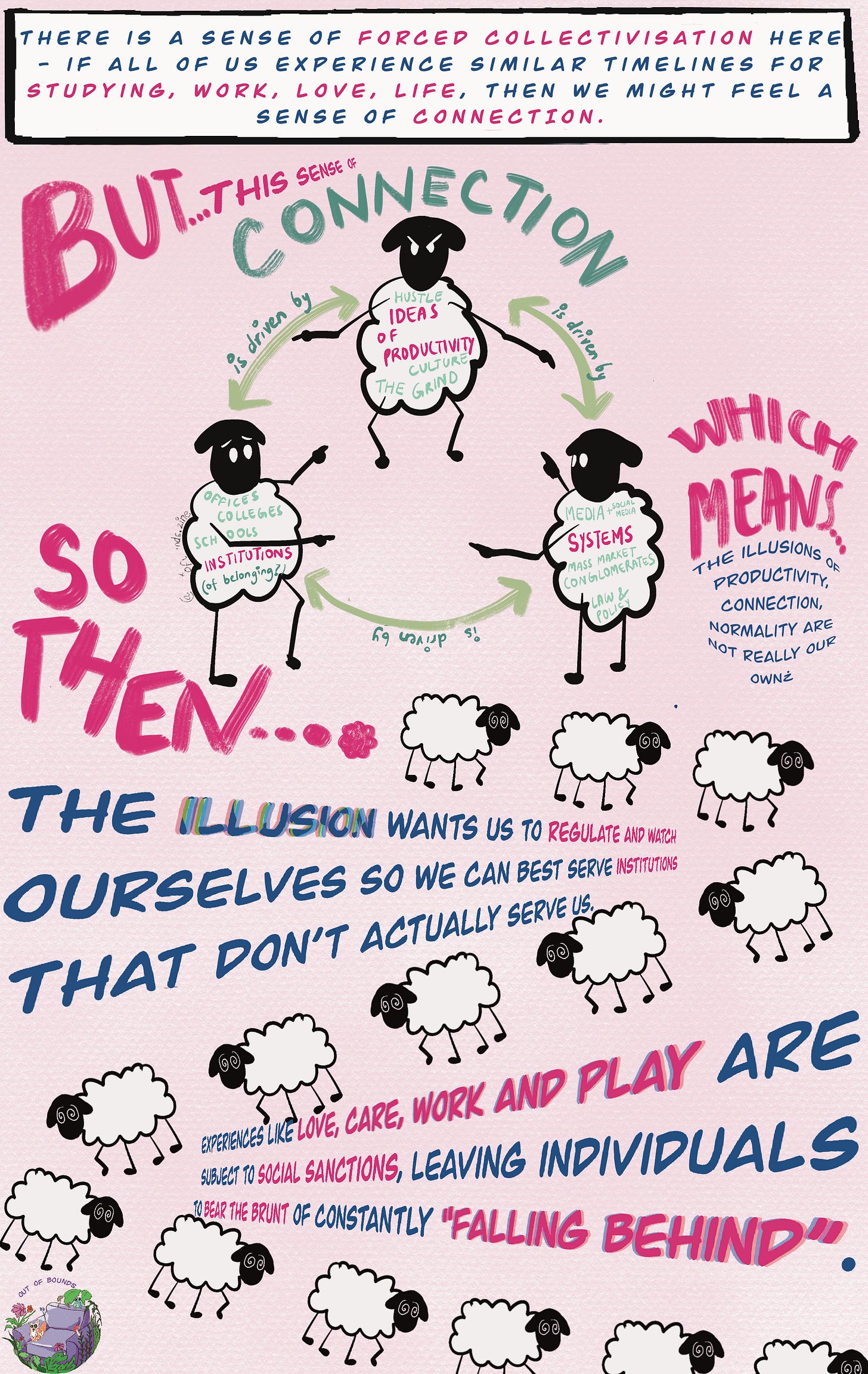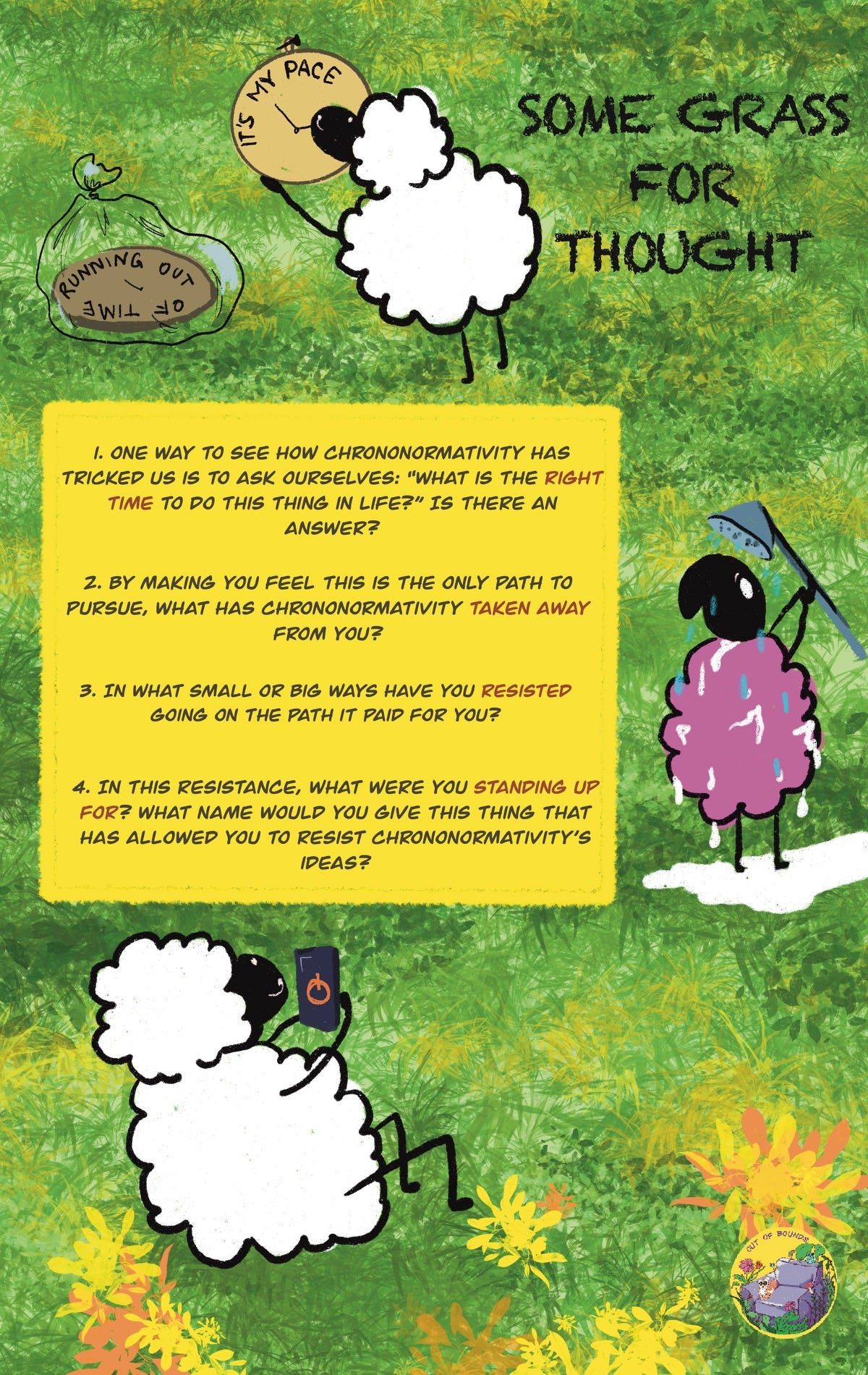Just tuning in? Read Part 1 here.
When we turn the gaze back on chrononormativity, we might see a familiar face looking back at us. This face has been lurking in the shadows, casting illusions of our one true or correct timeline. This face, or the Illusionist, curates a mirage of happiness and success right from when we’re young.
“Oh you have SO MUCH potential, only if you study/work/try a little harder”
“There’s plenty of time to figure out life when you’re young”
“You can have the best career, you can have the best of friends, just push yourself some more”
It is such a master trickster that we are charmed into believing its illusions, and all the other possibilities of what our life can look like become a blur. It doesn’t allow us to visualise paths that diverge from what it sells as the “best” path for us. We are hypnotised by its reassuring, repetitive whispers. What it never tells us is that it’s been selling the same path to every single one of us. The Illusionist presents itself as kind, encouraging, caring. It says it wants the best for us, so even when we do question its path, we assume that there’s something wrong with our perception (or us) rather than the Illusionist’s reality.
With the passage of time, we find that these whispers are not so gentle anymore. The Illusionist that we thought was our guide starts to surveil us, shame us. The words become harsher, more accusatory.
“Oh, so much WASTED potential”
“All this time and you still don’t know?”
“Look at everyone else, they had the best career and relationships a year ago”
It starts to make us question ourselves and our abilities. After our long-standing relationship with it, it feels hard to question the Illusionist. Instead, in hope for some answers, we begin to question ourselves. It attempts to isolate us by making us believe that everyone else has achieved the best life, and we are the only ones struggling.
How did we get here?
We are lured by the illusionist’s promises (tricks?) of success, stability and happiness. In this process, when we slip up, we blame ourselves for not reaching these ideals and forget to question where they came from in the first place. The reason the Illusionist is so successful: despite the larger timeline being the same for all of us, the threats it makes are somewhat personalized.
As neurodivergent people, it can be attractive that larger executive decisions for our lives can be predetermined. As much as we may enjoy our freedom, the fact that someone else could do that thinking for us feels like one burden less to contend with.
As queer and trans people, the alluring ideas of normality, normativity, and not being perceived and labelled as “different” can lead us to wear masks, paint and repaint ourselves to fit in - with cis-het people, of course, but also with other queer and trans people.
But where does this leave us?
The Illusionist’s tricks leave us isolated, surrounded by people going through the same thing as us, but still feeling alone. In a hope to establish this “lifetime” of security, we accept a trade of a “few years” of isolation and endless effort. We hope, so we believe. And that is what the Illusionist relies on.
Little do we know that these “few years” will become a lifetime of masking and painting ourselves to fit in, yet not belonging.
It’s safe to say that most of us are lured by ideas of certainty, predictability and a lifetime of security. Through this, we hope for connection and acceptance by the people around us. Despite the knowledge that the future is unknown,we do our best to predict it, with logic, calculations, manifestations, astrology, and all else. So, when the Illusionist says, “Here, just follow this”, we all begin to see it too.
After all, who does not like to hope for simple things?
There is a sense of forced collectivisation here - if all of us experience similar timelines for studying, work, love, life, then we might feel a sense of connection. This could look like friends getting married at a certain age, promotions happening around the same pace, achieving puberty at a certain age, making career changes only in your 20s, and so on.
But this sense of connection is also driven by ideas of productivity, which in turn are driven by institutions like offices and universities, which in turn are influenced by elements like mass market conglomerates, media and government policy. But does this create a real sense of belonging?
In other words, the illusion of productivity that chrononormativity tries to push onto us is not really our own. The Illusionist wants us to regulate and watch ourselves so we can best serve institutions that don’t actually serve us.
Experiences like love, care, work and play are then subject to social sanctions such as access to institutions like marriage that queer and trans people may not have, the demand to perform at a speed that is pre-decided, like three-hour exam durations, five minutes for mental maths or completing a grade’s worth of studying in one year and more. These sanctions can vary culturally, and leave individuals to bear the brunt of constantly “falling behind”.
Here is a glimpse of what the illusion has looked like for us. For the Frog, it was to finish school (hopefully with full marks and full attendance), choose science subjects, stick to a conventional career that is capable of ensuring me a secure income starting in my 20s. And this was to be followed by getting married by her late 20s. Even when the Frog strayed, the Illusionist always came back, asking her to overcompensate.
For the Cat, the illusion was to adhere to the school-college-job-marriage-children pathway, but norms and institutions can stand in their way to figuring out their identity. If she doesn’t adhere to the Illusionist’s path, then she has to figure out from scratch what life can look like away from this path. There’s no room for the Cat (and other Cats) unless these ideas are questioned - and does everyone really have the freedom to do that?
Bunny is a character from “Yeh Jawaani Hai Deewani”, a popular 2013 Bollywood movie. The dialogue in the image translates into “studying till 22, a job at 25, a woman at 26, kids at 30, retirement at 60…then waiting for death…I don’t want to live such a worn out life”.
In saying that he doesn’t want to live this worn out life, we wonder what made it possible for Bunny to say that he does not want to go along the path that the Illusionist has laid out for us.
Knowingly or unknowingly, we have all resisted going along the path that the Illusionist has laid out for us at some point. Through that resistance, we have chosen to honour our values, our thoughts, our principles and ourselves. For example, by beginning college at age 32, one may be honouring their commitment to their education. By choosing an ‘unconventional’ career path like being an artist or a social worker, one may be connecting to their interests and ethics. By living with your partner before marrying them (or not marrying them at all), one may be subverting traditional or cultural ideas of what a relationship looks like. By being gentler to ourselves when we “slip up”, we resist the shaming voice of the Illusionist. Even when we choose to momentarily not compare ourselves to people around us, we resist this voice.
It is important to note that resistance may not always be loud or larger than life. Very often, it is an everyday act, unacknowledged in the face of oppression.
One way to see how Chrononormativity has tricked us is to ask ourselves: "what is the right time to do this thing in life?" Is there an answer?
By making you feel like this is the only path to pursue, what has Chrononormativity taken away from you?
In what small or big ways have you resisted going on the path it laid for you?
In this resistance, what were you standing up for? What name would you give this thing that has allowed you to resist Chrononormativity’s ideas?
Out of Bounds is a collective aiming to bring psychosocial ideas and musings on mental health outside the therapy room and into our day-to-day discourse. © Sanjana Mishra & Isha Misra, 2024 (All rights reserved).











I wish more people spoke about this. How tough it is yet how simple too? It would all be much less exhausting if we all spoke about this openly, that all journeys are just okay yk? And hell yes! resistance is not always loud, it is also in the smol moments we decide not to respond to our boss outside of the work hours or the big ones where we decided not to get married just cz you are 30 years old! It's an amazing piece with absolutely brilliant artwork. The whole idea of the sheep mentality and the Illusionist is genius. Cannot wait for the next piece.